 Welcome to Day 6 of Hell Week. Today the Infernal Interview Service catches up with series creator Janet Morris, and her character Medea.
Welcome to Day 6 of Hell Week. Today the Infernal Interview Service catches up with series creator Janet Morris, and her character Medea.
Character Spotlight
About yourself:
*Who are/were you? Tell us about your life before you came here, and after.
I am Medea, daughter of the king of Colchis, niece of Circe, granddaughter of Helios the sun god, priestess of Hekate, who rules Erebos and judges the damned who come there. More to the point, I am the oldest witch in hell. I met Jason when he came to Colchis to claim his inheritance and swore to claim his throne by bringing home the Golden Fleece. Like a fool, I fell in love with him. I helped him secure the Fleece, pass every test, on the condition that he would marry me should we succeed. Sailing in the Argos with his Argonauts, we did all of those, and more
* Why do YOU think you’re in Hell?
Jason and I killed my brother, who came chasing after us to grab the Fleece once we secured it. Then, later, when he spurned me for a daughter of Creon’s, did I turn upon fickle Jason, and killed both our children. Although I had a right to my revenge, one of those or both brought me to hell.
Who are your friends/allies here?
Friends? If you wish a friend in hell, find a dog who lived on Earth before coming here. Scarce those are, but no scarcer than a friendly soul in hell. Those in hell who’ll help me are the Erinys, the Furies, the Moerae, the Fates; but those exact their own diabolical price. Men here like Jason, once my lover, might ally with me in perdition, but no one has a ‘friend’ in hell, anymore than a lover who will be true to oath or promise. And my once-husband, Jason? He sired a race called Minyans, bedding every Lemnian woman he could find. What more about his morals need you know? Such souls now feel my wrath and will feel it more, forever.
Do you have any enemies here?
My enemies are legion. Among the greatest are Jason and his crew of heroes, every one. Some of those heroes live on in hell, flayed, without a patch of skin anywhere upon them — a due punishment for men who killed so many whilst they lived. Some need more humbling; some have earned an afterlife of pain. And, by Circe’s will and Hekate’s devising, I am one who sees to the torment of the deserving. I have told you I am hell’s oldest witch, and thus damned souls are my natural prey.
Pirates – is that a word you resent?
In my days on the black earth, what you call piracy was an honorable profession, a way to test would-be heroes, and what then was called glory is now called evil-doing. In hell, sinners sin and sin again: their fates abide in their natures: and pirates in hell today can be thieves of music, words, or souls. I serve my purpose, to terrorize and penalize the damned. Thus I please the Lords of Hell and get my revenges. So do I resent the word piracy? By all means, if you mean my ‘piracy’ from ancient times. My deeds that got me here were fated, not my fault.
Hell covers all eras and technologies, there are many hells within Hell. How have you adjusted to this strange world?
I stay much to myself, much in Erebos, where I can drink the Waters of Forgetfulness should I wish a good night’s rest. Because I am hell’s greatest sorceress, I travel whither I choose, chasing enemies, breaking hearts, setting rights to wrongs, and wrongs to right.
How do you define ‘piracy’?
Define it? I lived it when such a quest had meaning. Now mere plagiarists and thieves of arts and letters are called pirates. Here latter-day warriors have weapons that make cowards of them all. To me, betrayal of the heart is the greatest piracy: Jason stole my heart – how long ago? – and I’ve yet to get it back. So his steps do I shadow, his hopes do I destroy. And all like him, arrogant men who sack and pillage and lay waste here in damnation, are due to feel my wrath before infernity shall end.
Describe your home/environment in Hell.
I have said, I rest in Erebos, where those heroes end who can’t remember their names or fames. From there I range wheresoever my damned quarries roam. Satan sets me tasks in his New Hell, where the New Dead dwell; nor are the Old Dead safe from me. But, alas, not even the greatest witch in hell can rid its fastness of guilty humans. But I say to you that the New Dead, those hedonistic souls who care only for themselves, torment one another more than even I can devise. So I stay among the Old Dead, since sinners there abound, and pick and choose. And why are you here, my dear? Have you not yet felt my fury?
Come on be honest, what do you think of HSM leadership?
Ah, Satan. He is what he is, suited to his modern flock of fearful souls, who all believe they don’t belong in perdition, who groan and moan over the slightest torture. Ha! Now, Hades: there is a ruler worthy of the name.
What is the WORST thing about being here?
That I still love Jason: that’s my torment. No matter how I try, I cannot shake his hold on my poor and shrunken heart.
Erra and his Seven – what’s going on there then?
Ah, Erra and the Seven – called the Sibitti. Erra and his personified weapons are doing more to make the underverse hellish than Satan ever did. The plagues in hell are of Erra’s making, and the floods, and there be more to come from the Babylonian Plague God and his minions., before eternity runs out.
What are your best tips for surviving in Hell?
Surviving hell? All souls in hell are dead, do you not realize that? What survival do you mean? The survival of the soul? They have that, yet they complain. Soon enough, methinks, Satan will turn to obliteration: an end to all hell’s over-crowding, and to Satan’s own sentence here. Hell has its gods, to commute a sentence. Irkalla can send a soul straight to what you call heaven, if she will. But seldom does. The damned get here, and then they sin, and sin, and sin: every evil inherent in their persons do they exalt. So few, the tiniest fraction, deserve salvation. And those masses who love evil, and repeat their crimes in hell, are cursed with survival: even if they die, the Undertaker resurrects them, and they return to their vile ways. For those who cannot bear more punishment, hell holds out obliteration: not only not to be, but to never have been at all. And this, to arrogant humankind, is the most frightful end, yet devoutly to be sought by the worst offenders here.
Before you arrived here did you actually believe in HSM and his fiery domain? Bet that was a shock!
I came not to New Hell, where Abbadon rules, but to Hades’ domain, where I have respect, even in Tartaros. There am I assigned retributions to meet out to the damned. Remember, I am not a damned fool like you. I am the oldest witch in hell. So bow down before me, and I may be easy upon you, sinner.
Eternity – that’s a damned long time. How to you spend the endless years here?
Time here is fluid. A day can be an hour, a century a week — never time enough for anything redeeming to be done, but time enough for every evil to mature, and spread, and multiply.
What do you miss most about your old….life?
Jason, when we were lovers. Jason, even now that he despises me. With love grown cold in his breast, I miss my days among the Argonauts, when heroes were heroes and my powers at their peak. Yes, Jason. I miss him only, and miss him most of all wherever in hell I may roam.
Author Spotlight
*Janet Morris (a/k/a Janet E. Morris)
Here is my bio from Wikipedia: https://en.wikipedia.org/wiki/Janet_Morris
My first book was published by Bantam in 1977, and I have been writing for a living (fiction or fact), ever since.
* Tell us about your story for this edition.
What inspired you to use the character(s) you’ve chosen?
Hell has so many fascinating characters, as many as human history has produced, that I use both characters who continue through the series, and characters who have only a bit of time upon Hell’s stage. Right now, I am writing Heroes in Hell stories with my husband Chris, and these center primarily on William Shakespeare and Christopher Marlowe, and how their compatriots or inheritors in life are faring in hell. We already know what brought Marlowe to hell. He’s there for writing in Faustus the line: “Hell is just a frame of mind.” In Pirates in Hell, we find out why Shakespeare is damned. This round, we had a fortuitous intersection with current reality, where Shakespeare and Marlowe are concerned: in 2016, scholars decided/admitted, using technological capabilities to underpin instinct and study, that Marlowe must be given co-author credit on at least Henry VI, Part 1, 2, and 3. That, plus the fact that Pirates in Hell admits stories swung around all sorts of piracy, allowed us to use the premise that, in hell, where book piracy and plagiarism are rampant, Marlowe and Shakespeare spat about how and why Kit Marlowe’s name has been omitted as co-author of Henry VI for centuries. Since Marlowe still struggles under a curse which allows him to remember lines he and others have written previously but gives him a hellacious case of writer’s block where new work is concerned, the restoration of Marlowe’s name to at least the Henry VI plays was a story-line too enticing to ignore.
How did you become involved with this project?
I created the Heroes in Hell series when I was at Baen Books and had a multi-book contract that had no creative limitations, not even specific titles: this ploy was how Jim Baen lured authors he otherwise could not afford. So I mentioned the Heroes in Hell concept to Jim Baen on the phone and he agreed I could do a “shared universe” series called Heroes in Hell (HIH). And that I did, creating, producing, commissioning and editing multiple volumes of stories from authors (many of them writers who then were also friends) that include, so far, two Nebula Award finalists and a Hugo Award winner. We did 12 volumes, including both HIH novels and HIH stories, in the 20th century, and resurrected [sic] the concept in the 21st century with volume #13, Lawyers in Hell. Pirates in Hell is #20. But, since all Heroes in Hell volume have a targeted subject, and yet each stands alone, you can start anywhere in the HIH series, make your own order, depending upon your interests: you can choose to begin with HIH novels or HIH shorter fiction. The rules in hell are simple: no one rightly sent to hell gets out. For each novel or story, given writers must use several historical characters, or mythic characters, or legendary characters previously approved for their use by me, and follow the long-arc of the series per se, as well as a volume arc Chris and I give them. We then approve their story concepts before they are allowed to write, since the HIH universe (Hell as we describe it) is our property . So with these constraints, the volumes each have a theme and yet they are subject to tie-in thematics from other volumes which we provide to them.
Writing for a shared world requires rules all writers obey. Even without that constraint, writing for a shared world is most challenging, particularly when you haven’t used a character previously. Introducing new characters, writers must answer the following question to my satisfaction and Chris’: “Why is this character in hell?” Often the basic answer is revealed early in the first story using that character, sometimes it is revealed slowly. If you are using characters previously used by others, you must get my permission to use preciously-appearing characters, and write them to be consistent with the way they’ve been written previously. We have voluminous documents to which writers can refer, not only about New Hell, but about many of the dedicated hells such as Tartaros or Arali. Since it is in human nature that like groups flock together, we have a few dedicated hells, hard to get into or out of, whether or not you are native to that culture. Some of these are Greek or Akkadian or Elizabethan. With the future hells, we allow only agreed-upon technology and future history, since no character can be historical if that character has not yet lived. Some people wheedled the option of writing about fictional characters, but those are rare, and they must be characters from the 19th century or earlier, or characters or persons from recent times who are in the public domain.
Tell us why you chose this story to tell out of so many possible options?
While Chris Morris and I are working with Shakespeare and Marlow, we’ve been focused on their thread, but always include a new or different character as well, such as J the Yahwist or Diomedes from the Iliad or Medea the Colchian witch. Satan is one of our characters, so we always write a first story which doubles as an introduction to the volume, That first story is always the most taxing one, since we need to find a way to set up afresh the constraints, threats, and givens that all writers of that volume will share. It’s great fun, but its job is to serve as an orientation for the volume not, in or of itself, serve as a free-standing story, though sometimes we can make the intro story serve as both.
What are you currently working on?
I am still working on Rhêsos of Thrace, and also, with Chris, doing the updating and revising for the Author’s Cut volumes of my backlist. We’re only now finishing Tempus Unbound, and on deck is City at the Edge of Time, to be followed by Storm Seed; when those three are released, the ‘Farther Realms’ Sacred Band books will all exist in Author’s Cut editions. Besides our own work, we edit and format works by some writers who interest us, including but not limited to Michael A. Armstrong, Andrew P. Weston, Walter Rhein, Thomas Barczak, so publishing per se takes up much of my time. Plus, although we don’t take unsolicited submissions, we are always reading submissions from writers we find compelling.
If you could have a dinner party with any man and woman from anywhere and any when who would invite and what would you eat?
I’d invite Heraclitus of Ephesus, Confucius, Albert Einstein, Roger Penrose, Homer, Marguerite Yourcenar, and a smattering of my HIH characters: the Yahwist, Shakespeare and Marlowe. We’d eat roast lamb, which is familiar to all, barley and wild rice, and desert would be a green salad and/or a cheese board. We’d have wines with the meal and after, with chocolates.
Which 10 books would you save to keep you sane after the apocalypse? Oxford Classical Dictionary, American Heritage Dictionary, The Iliad, the Odyssey, Paradise Lost, Hamlet (or complete Shakespeare), Tamburlaine, Faustus, the I Ching, Spenser’s Fairie Queen.
EXCERPT from your story.
Goat-Beard the Pirate, Part 1
or
Bitter Business
Janet Morris and Chris Morris
“Now I could drink hot blood and
and do such bitter business as the
day would quake to look upon.”
—William Shakespeare, Hamlet
“Piracy in hell is bitter business, when freebooters steal whate’er a soul holds dear.” Grey doublet askew, buff linen shirt open, sans breeches and still bare-arsed but for hose, Kit Marlowe stalked Will Shakespeare across their attic hideaway in the New Globe Theatre. Heels drumming, Kit dogged Will until poet cornered poet at arm’s length. “And bitterest when what’s stolen is words, and the thief’s a lover, a friend — or you, vaunted Bard of Avon.”
“Call’st me thief? O’er the three Henry the Sixth plays?” Shakespeare rose up stiff and livid. “Accept this truth: Once you were dead and your name expunged from those scripts, I ne’er could restore it. When Satan reissued our Henry Six ‘masterworks’ as mine alone, he meant to vex you, Kit. This bone you’d pick with me’s sucked clean of marrow. Pirates run amok throughout perdition. Not only do they ply the floods and stalk the shores, they infest New Hell’s publishing houses. When we both lived, you helped me, yes. But —”
“Helped you?” Kit nearly spat. “But what?”
For a painful eternity, Kit’s question hung in the air between them, an implacable specter, until Shakespeare sought sanctuary in Hamlet’s speech: “‘But break, my heart, for I must hold my tongue.’” Will hid his bearded mouth behind a fingering hand while his eyes pled mercy.
They seldom fenced with quotes lately, too angry at each other. But now that Will had begun it, Marlowe meant to weaponize the game. For his first beat, he brandished his Elegia 1: “‘Rash boy, who gave thee power to change a line?’ An attribution line at that? In hell I may be, but ’tis insufferable to be plagiarized by you. . . .”
“Kit . . .” Shakespeare’s riposte died upon his lips.
Pulse racing, fury out of control, Marlowe tried to stem his words, but failed: “This bit’s yours, or so you say, but it’s surely apt: ‘For I have sworn thee fair and thought thee bright/ Who art as black as hell, as dark as night.’”
“With my own sonnet you dare despise me?”
“Despite is but a taste of what you’ve earned from me,” retorted Marlowe, tongue clumsy, blood rushing in his ears. “Did you not proclaim in Henry the Fourth ‘the fox barks not, when he would steal the lamb’? Take care, brash despoiler who hath ravaged me. Confess and make amends, Willie, or that’s the last quote of ours — or is it yours? or mine? — ’twill issue from my lips till infernity runs out.”
In the garret they’d leased once Satan expelled them from Pandemonium, time held still. Kit’s ears heard nothing but their breathing; no draft blew through their attic to cool their wrath; no sweet peace winged their way.
“Thus dies our game of quotes and more, this day!” Shakespeare’s voice shook; wherever no goat-beard bristled, his rosy cheeks drained white. He stumbled over his own lines from A Midsummer Night’s Dream: “‘O, then, what graces in my love do dwell,/ That he hath turn’d a heaven unto a hell.’”
“Your ‘love’ am I? New words may come hard to me, but mine old I have aplenty. Recalling olden words, here’s more ‘deathless prose’ in which I had a hand but got no credit: ‘Love is familiar. Love is a devil. There is no evil angel but Love.’ Or so we once agreed in Love’s Labours Lost.”
Shakespeare sighed. “Marley, I’ll see Old Nick this very night. Beg him to change those attributions and include you. No sinners read those early plays; instead they ogle the hell-born travesties we stage for Satan. Since your words dried up, your soul’s gone cold. But we’ll fix it. Fix everything.”
A promise impossible to keep in hell, now we’ve provoked the Deceiver’s envy of what we two alone can share.
Marlowe shook his head, raised empty hands and dropped them to his sides. “There’s no fix for human frailty; no cure, unless it be Milton’s ‘obliteration’. And as for piracy, I bore with its bile whilst we lived and taste it still. But run not to the Archfiend’s wily embrace. He’s got no Muse of fire for me nor patience left for you; your glory droopeth, to his baleful eye.”
“Not so. Come with me, Kit, to His Infernal Majesty’s reception. Tonight. We’d best not ignore his invitation. All New Hell’s illiterati and their publishers has he summoned: every paltry poet and pusillanimous pundit in perdition will attend. As your Passionate Shepherd begged, ‘Come with me and be my love,’ and we’ll make every slight that’s wrong come right.”
When Will Shakespeare wheedled, contrite and on his game, Marlowe never could resist him. Yet Will’s affair with Satan too oft abandoned Kit to Jealousy’s embrace.
From their window overlooking the Globe’s stage and its tuppenny seats came a scrabbling of claws, a whoosh of wings, a shower of glass. Like love in hell, no pane in that window ever lasted long, but shattered once puttied into place. Kit spied the vandal, a red-eyed bat hanging upside-down from the window’s empty frame, staring unabashed.
Bats in hell exhaled contagion wherever plagues rode the air.
The hairs on Marlowe’s nape bristled. Heed this omen, Will Shakespeare: Diábolos, Old Scratch, the Prince of Hell, call him what you will, now sends his presumptuous bat, wings wide, for you and me.
Aloud, Kit scoffed. “Be your love, Will? At what cost? Go with you where? On this unclean night? Through twisty byways where purge and pestilence sack the damned?” Alas, Kit knew he’d do what Shakespeare asked, face even obliteration for this wraith, this shadow of the man he’d loved so well. “If you insist, I’ll attend you on this fruitless errand, albeit I’ve no hope for it. Your lusty devil won’t heed my plea, or yours. How many times before has Satan backhanded me for barging along beside you?”
At Kit’s last word, with one flap of wings the bat dropped from the sash and glided into its mother night. Did it hear? Understand? Hell bore few animals as the living knew them: hell-bats to shrive the doomed; hell-goats to feast on garbage; hell-horses whose manes and tails hissed like asps; hell-hounds, sometimes manlike. Save the rare curs or coursers come to seek their masters, hell hosted no loving fauna, no creature company for the dead.
Marlowe buttoned his threadbare shirt, donned his breeches, and paced Will through soggy lanes where few dared walk, where brigands roamed in gangs. Here Satan’s latest purge dissolved unwary souls to salty sand, while other damned, unscathed, scuffed through their glittering remains. If not for the floods that flushed its streets, Marlowe thought, New Hell soon would be but one huge dune.
Past the New Globe they ventured; past the Rose, still dark in fear of plague. Receipts were down at every playhouse, audiences scarce. Nevertheless, when they reached their destination the sidewalk teemed with the sad, the bad, and the mad, a mob desperate to gawk at arriving unworthies and glimpse the infamous.
An imposing structure overshadowed all. The hub of Satan’s New Hell seat, a horseshoe upside down and open at its top, arched toward Paradise and its bloody vault. Red carpet smoldered underfoot, gold festoons lined the forecourt’s fence. Torches blazed along ranks of spearhead finials on wrought-iron pickets, displaying the occasional severed head.
At its grand entrance, fiends of carmine and black formed a sweaty cordon barring groundlings here to gawp, whilst Shakespeare’s name assured entry for him and Kit as if it were a watchword.
A liveried orange demon who reeked of week-old corpses escorted them inside, around, up and down stairs that led in more directions than hounds seeking scent, till they came to a cathedral of a hall.
Once inside, their demon guide bowed low and left them.
Now Marlowe realized where Shakespeare’s fame had brought them. This was a fete for the piratical elite, an A-list affair convoked by Satan’s Masters of the Revels, his seven fallen angels, each banished warrior of heaven more gorgeous than the last. Before them, souls from every epoch mingled, resplendent in outrageous finery. While outside calumny, poverty, deviltry and woe oppressed all hearts behind the spear-topped fence, here chatter flowed, laughter pealed.
And stopped . . .
Into that sudden silence, a second orange demon boomed their names, its tail wagging like a dog’s: “Master Shakespeare and Mister Marlowe.”
Necks craned. Fingers pointed. Misers and monsters, demons and debauchers (hell’s every publisher, privateer, prostitute, pimp and poseur) took their measure.
Marlowe tugged his doublet tight to hide threadbare shirt and cuffs, while leers cast his way said he’d be welcome naked. When he’d been a player, spy, and rakehell, such looks had bought him comfort on many a night. Notwithstanding, at that awkward moment Kit felt supremely underdressed; he should have followed suit when Will buttoned on grass-green shirtsleeves and donned his candy-apple codpiece; or at least worn a leather jerkin over the doublet — but no: rebellious, he hadn’t.
A sigh of whispers grew among this staring clutch of vipers. The crowd parted, and Marlowe happed upon more pressing matters to regret; for toward them strode Satan himself, reigning lord of the latter-day hells, a sinning soul on either arm: one male, one female.
“Will, be you wary . . . keep in mind why we’re here.” Kit tried in vain to wet his lips. When his words had fled him at Satan’s behest, they’d taken all his spittle with them.
“Do you see who that is, the big hairy man in the brown mantle, leaning on his staff?” Shakespeare’s whisper tugged Kit’s ear like a child: “King Solomon, from bible times. Do you recall him from the polo field where he begged my bodkin to slice that infant in half?”
A phantom babe, if ever it lived at all, meant to raise hopes of innocence and dash them, the Trickster’s favorite game.
“Will, remember, we’ve only come to convince Old Nick to redress this piracy; provide compensation, restitution or at least retraction, emendation, some satisfaction. . . .”
Shakespeare heeded not a word, but floated down that final stair and straight to Satan, white-winged and magnificent. Beneath one creamy pennon slid the Bard, as if into his rightful place.
That freed the female from Satan’s hold. Once out from under the devil’s pinion, Kit recognized her: J the Yahwist, she who first gave song and grace to the Old Testament.
J regarded Kit with but the faintest smile, as might a goddess . . .
She’d understudied a role in a play of theirs, come to a dress rehearsal, but they’d never stood this close. She extended a hand to him.
He couldn’t resist. That hand promised lost joys. Forgiveness nestled in her eyes. Exaltation graced her lips. She smelled of sympathy and more: a scent with a darker note, a hint of expiation. . . .
Kit Marlowe took two steps to kiss fingers that scribed the advent of creation. Her touch brought him near to tears. “Yet hell-bound, mighty J? Why do you tarry? Why comest thou here?”
“I am come for a line of mine, pirated by a mortal, a self-styled apostle named John: my line about the Word. Do you know it?”
“Know it? I lived it. Yes, I know it.”
“And do you not hear, with your unerring ear, that it belongs with my Genesis, not with the scribblings of some Johnny-come-lately?”
“I hear.” Many dwelt in hell, but this soul, called simply J, belonged Above. She had come on Mercy’s agency, rumor whispered, to inspire the damned — to give them words, give them hope — and been entrapped by Satan’s wiles. Within her orbit, for an instant sorrow left him. Kit forgot all travail, forgot even delirious Shakespeare, snuggling in the curve of Evil’s wing. . . .
“And why are you here, Christopher Marlowe?”
“I’m here about a play or two I helped write. But standing next to you, my loss sums as naught.”
J’s laughter tinkled like bells. “How could that be, you who wrote ‘Come with me and be my love?’” From her lips, the same line Will had used to jolly Kit into coming here became eerie, beguiling; as was what followed: “I have extra words betimes; words meant for hell’s most needy. Who knows but that I might have some for you? Would you want words about love transforming all, Kit Marlowe? Words to sound a higher octave of being? Would words to transfigure suit you?”
“What? You mean you could . . . ? I’d — That is, you would . . . ?”
Meanwhile, Shakespeare had not forgotten Kit:
Into Marlowe’s colloquy with J intruded the Bard’s voice triumphal: “I did what you wanted, Marley. I have Satan’s promise. And look who I found! You recall King Solomon: Solomon of the Song of Songs, of —”
“Will, not now! J says she . . .” Kit looked from Shakespeare to J, but she had slipped away into the crowd.
Consternation must have remade Kit’s face, because bulky, rough-hewn Solomon shrugged: “The Yahwist seeks her own redress of grievances. And a way out of hell.”
Kit could no more than stare.
“Everyone in hell seeks a way out.” Will sneered. “What makes her special?”
“She does.” The apostate King Solomon struck the floor with his staff for emphasis. “You must understand: J has basked in the paradisal light, walked near to the One — and now, for denying her faith by a slip of the tongue, she is marooned here.” Solomon sighed like a desert wind. “I know — she offered you words, didn’t she? She would. But our host Abaddon will never let her heal a soul like yours, as damned as your friend here describes you. You’ve doubtless heard my proverb, ‘As iron sharpens iron, a friend sharpens a friend.’ Few in hell have a friend. Do not pursue the Yahwist. Cleave to your friend Shakespeare and seek the truth of ages.”
Solomon’s words fell like rain on Kit’s roof. Marlowe had no answer for the Israelite king’s bombast but to look away, seeking J’s face in the crowd.
Alas, no Yahwist.
Where was she? What was she? A fortuity found and lost in a heartbeat? Salvation? A glimpse of deliverance? A breath of the sublime? Her offer of words — words to heal his mind, his heart, his riven soul — might never come again. Kit’s gut growled, protesting his loss.
[End of Excerpt]
Links:
https://www.amazon.com/dp/B06Y8WWKMT/
http://www.barnesandnoble.com/w/pirates-in-hell-chris-morris/
https://en.wikipedia.org/wiki/Janet_Morris
https://en.wikipedia.org/wiki/Chris_Morris_(author)
https://en.wikipedia.org/wiki/Heroes_in_Hell
https://www.fantasticfiction.com/m/janet-morris/
https://michaelaventrella.com/2012/05/15/interview-with-hugo-nominated-author-janet-morris/
https://plus.google.com/+JanetMorrisaspis/posts/fKEThwitP61
Facebook
https://www.facebook.com/JanetEMorris/
https://www.facebook.com/pages/Janet-Morris/108035375883983
https://www.facebook.com/search/top/?q=janet%20morris%20and%20chris%20morris
Blog/Website
http://www.theperseidpress.com/
https://sacredbander.com/
Twitter
https://twitter.com/uvmchristine
https://twitter.com/uvmchristine/media
Amazon
https://www.amazon.com/dp/B06Y8WWKMT/
https://www.amazon.com/Pirates-Hell-Heroes-Janet-Morris-ebook/
https://www.amazon.com/Janet-Morris/e/B001HPJJB8
https://www.amazon.com/Pirates-Hell-Heroes-Janet-Morris/dp/0997758449/
Goodreads
https://www.goodreads.com/series/40812-heroes-in-hell
https://www.goodreads.com/author/show/121072.Janet_E_Morris
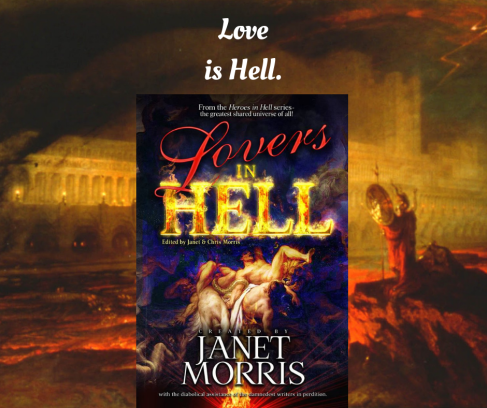
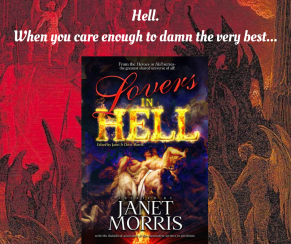

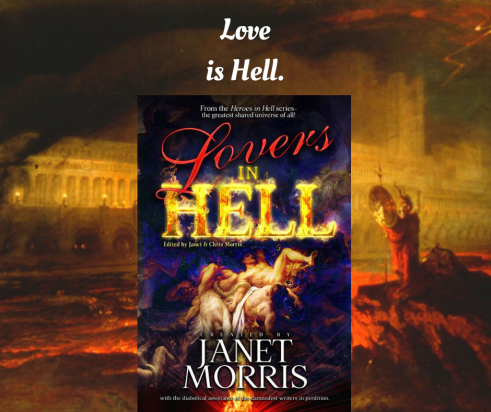
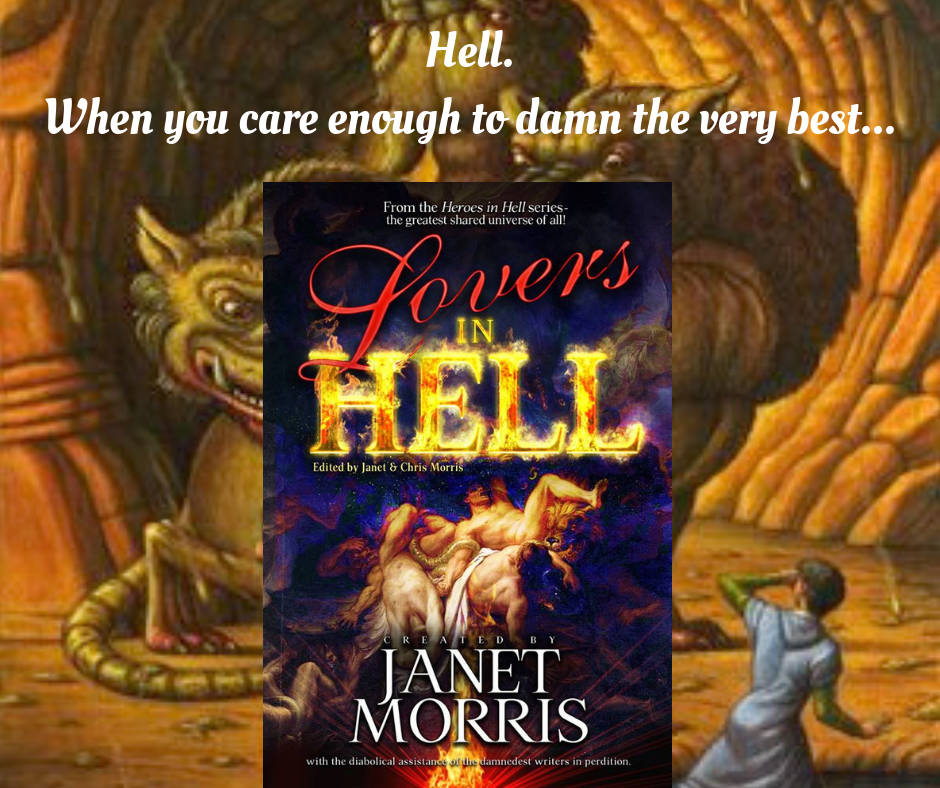

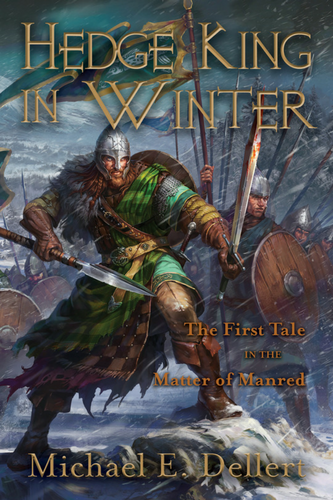

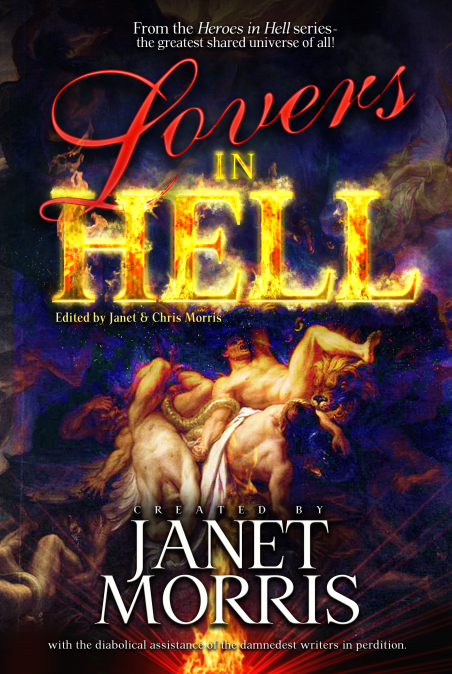
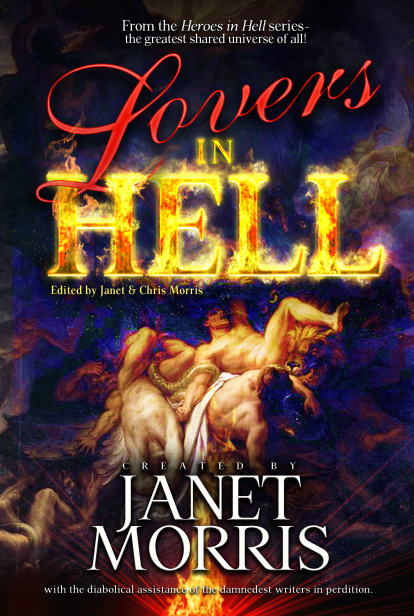
 Welcome to Day 6 of Hell Week. Today the Infernal Interview Service catches up with series creator Janet Morris, and her character Medea.
Welcome to Day 6 of Hell Week. Today the Infernal Interview Service catches up with series creator Janet Morris, and her character Medea.